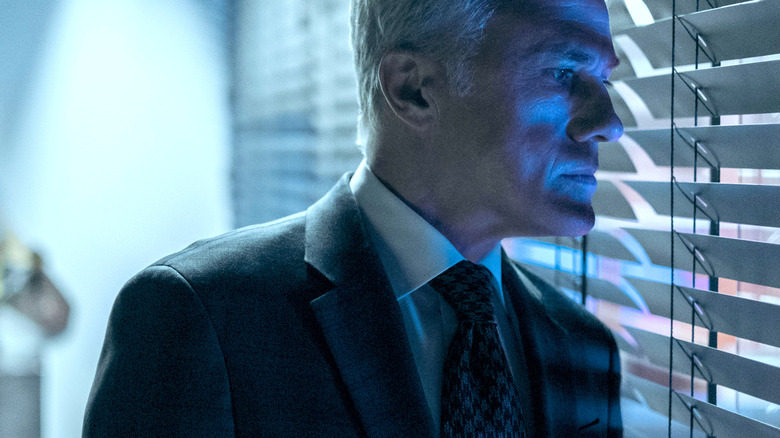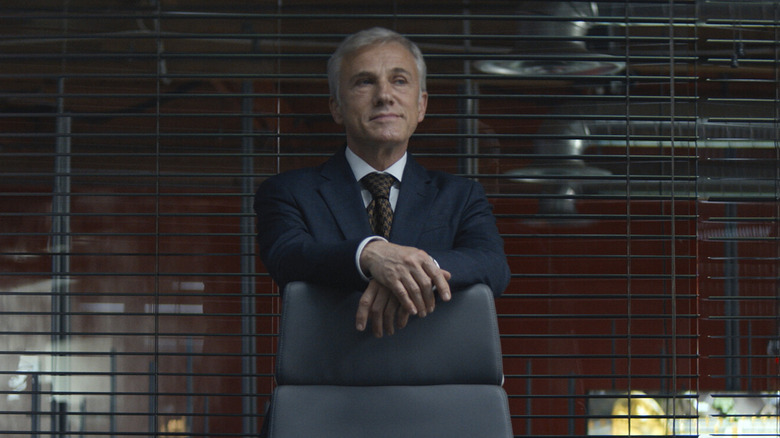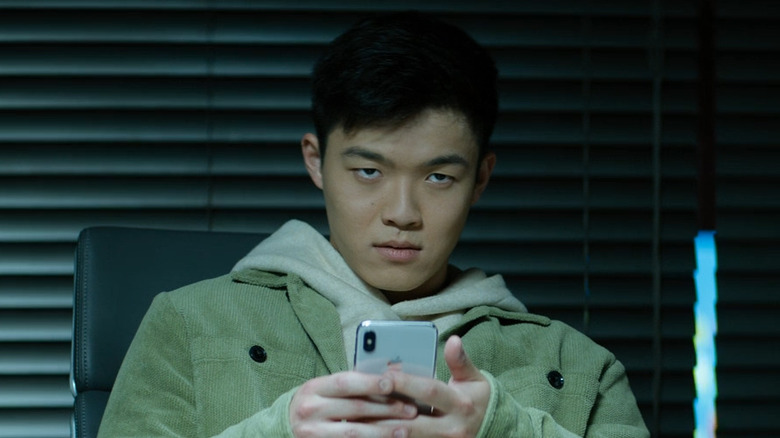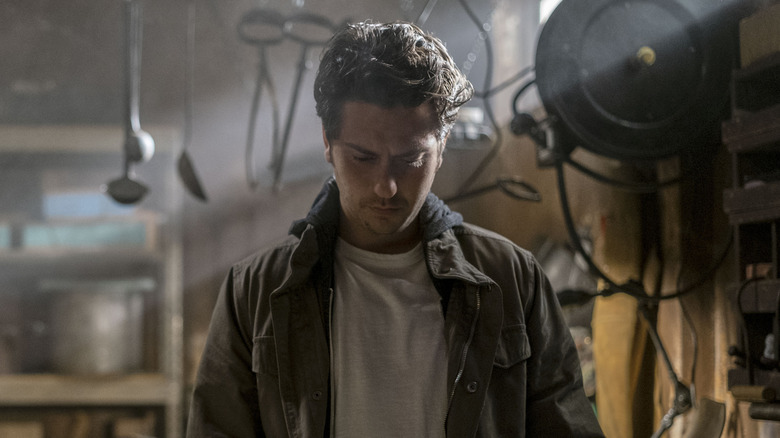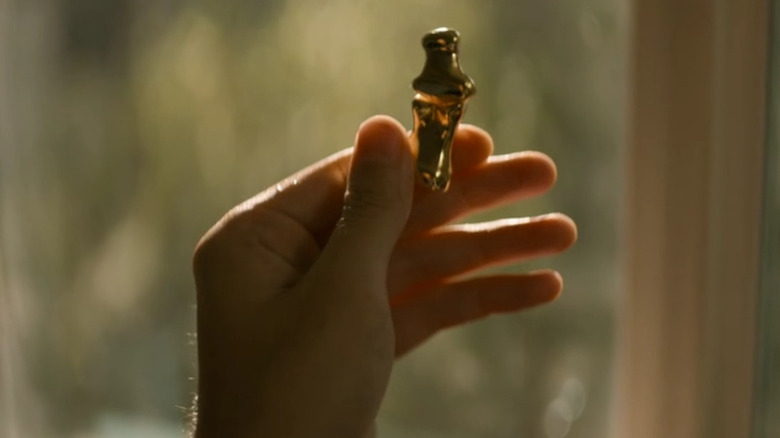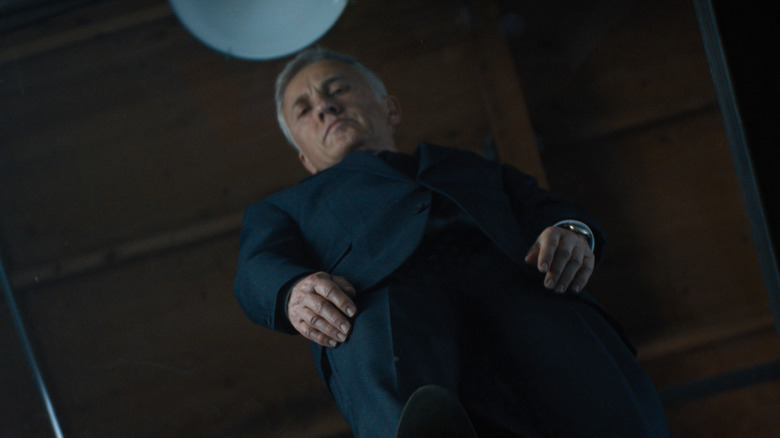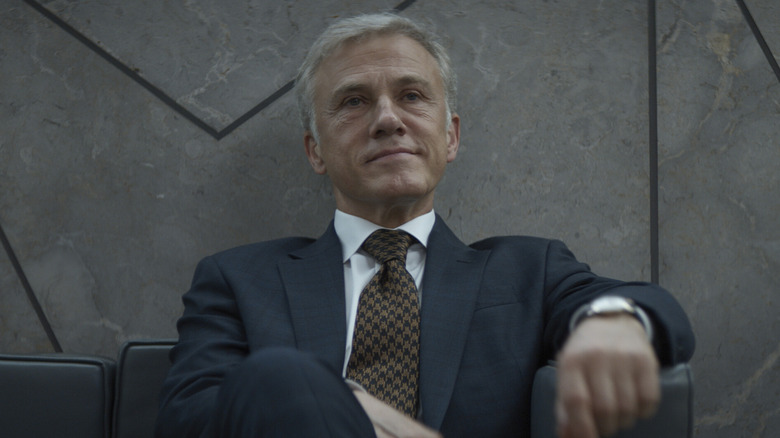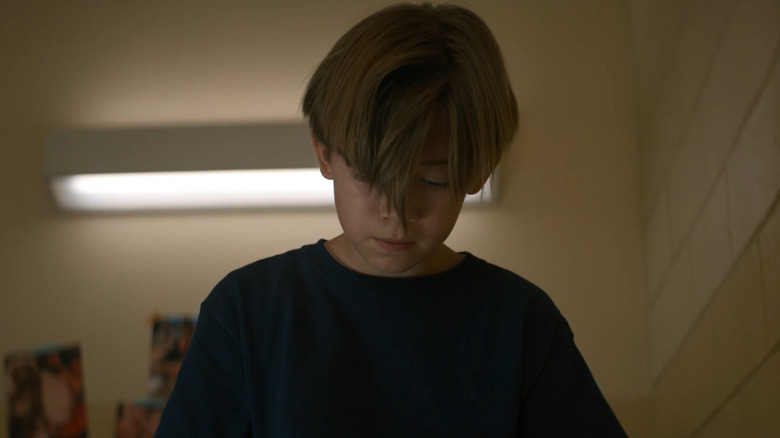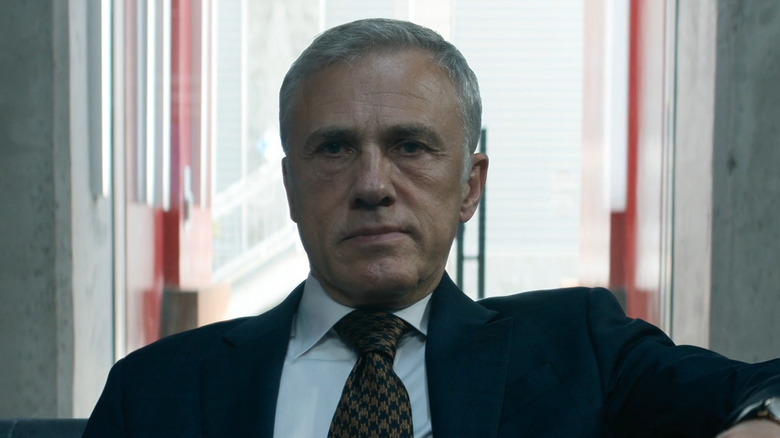The Ending Of The Consultant Season 1 Explained
"The Consultant," a new series from Amazon Prime Video based on the book of the same name by Bentley Little, takes the concept of "the boss from Hell" to an entirely new level. Craig Horne (Nat Wolff) and Elaine Hayman (Brittany O'Grady) are employees of CompWare, a game development company run by Sang (Brian Yoon), an innovative and young CEO. After his sudden death, the company is in free fall until a man named Regus Patoff (Christoph Waltz) turns up to save the day. With a contract signed by Sang and a vision, he presents himself as a consultant there to help the company during this difficult time.
As the series progresses, Craig and Elaine (and the audience) learn that nothing is quite what it seems with Patoff. From his strange arrival to the way the glass stairs creak whenever he uses them, there is something off about the consultant. Craig and Elaine follow a proverbial trail of breadcrumbs, trying to find out who he is and what his methods could be, but ultimately, they are both sucked into his plans for CompWare.
Who is Patoff? What are his intentions in working with CompWare? Will he save the company? "The Consultant" may answer these questions. Let's break down everything you need to know about the series, what the ending means, and if we'll be seeing Patoff again in the future.
Is Patoff really a consultant?
When Regus Patoff is introduced, he calls himself a consultant. Elaine asks what he is going to consult on, and Patoff simply responds that he is there to look at all aspects of the business. This seems to include everything from game design to desk assignments.
Typically, a consultant is working with the person who hired them. In Patoff's case, his client has to be dead for his services to go into effect. This means that he isn't a consultant in the traditional sense. The only person he is really working with is himself, and maybe a select few employees he lets into his inner circle.
In his role, Patoff comes in and takes over the company simply because there is no other leadership in place. Rather than be a consultant, he is the de facto CEO. In the wake of a company losing its leader, he takes over that job. He leads the employees as he determines what needs to change so the company can continue to thrive and create a lasting legacy for its fallen captain.
However, his tenure as CEO is never designed to last. Within several weeks, he creates the legacy he is contracted to and moves on to the next business. In that respect, he is a consultant. He comes in and leaves soon after, theoretically leaving something better in his path, no matter how much destruction it takes to get there.
Patoff's work feeds off hubris
Patoff appears at companies, without appointments, with the simple request to meet the person in charge. With Sang, he waits for nearly an hour for a 14-minute conversation. During that meeting, Patoff uses persuasive language to convince Sang that his company is in dire straits financially. Without Sang's death and Patoff's intervention, CompWare will crumble, and the only thing people will remember the 20-year-old CEO for is his inability to make a hit game.
Patoff's work thrives off of targeting someone's hubris. In Sang's case, he is a young company owner that doesn't really know what he is doing. Rather than run his company into the ground and live to see it happen, Patoff gives him a way out that ensures CompWare's future. Making an arrangement with Patoff means Sang doesn't have to watch his company fail and the general public will remember the legacy Patoff creates.
The "consultant" seems to have insider information about the companies he visits — for instance, he knows CompWare can only afford to pay its employees for another four months. How he gets this information is unclear, but he uses it to take advantage of the CEOs he approaches. He targets their fear of failure and uses it to convince them to sign a contract that gives him complete power over their life's work upon their death. Does he leave the companies in a better spot? He seems to, but it's at the cost of the founder's life.
Elaine's career takes off
When audiences meet Elaine, she is Sang's assistant. She handles his schedule and hosts tours of the office when school groups come in. She may even help him make creative decisions. With Patoff's arrival, she rebrands her position as "creative liaison," glamorizing her role a touch as she applies to other companies.
As the season continues, Elaine becomes more involved with decisions like helping with focus groups and marketing for the new game in a way that helps her stand out. She asserts herself by snagging an office in the managerial suite and seems to modify her office reputation as the approachable assistant. She changes into a person who is trusted with more significant decisions and is envied because of her newfound confidence.
Elaine is the one Patoff decides should take over CompWare after he departs. Thanks to Patoff's pushing, she finds her voice and learns to navigate the world in his shoes. She successfully plans the kidnapping of an elephant to promote the new game and uses unsavory means to convince an ex-boyfriend to carry it out. She shows she can be cutthroat, which Patoff seems to believe is necessary to be the leader of CompWare. She grows from a pushover into someone who can't be steamrolled and proves she can continue the legacy Patoff starts. It's the epitome of someone growing into who they are meant to be.
Craig's career is moving in the wrong direction
While Patoff brings out the best (and maybe the shadiest) work ethic in Elaine in pushing her to be the leader she is destined to be, he does the exact opposite for Craig. Despite working for a top company, Craig does not have any confidence in his own abilities. He doesn't believe he's a strong coder or that he deserves to work at CompWare. This feeling only seems to intensify when he fails Patoff's test, especially when the consultant says he wouldn't count on the coder in a crisis.
As the first two members of CompWare Patoff meets, Elaine and Craig are both tested by the consultant. Craig's perceived failure is punished as Patoff interferes in his relationship and career. Despite coming up with the base idea for "Mr. Sang's Jungle Odyssey," Craig doesn't get to work on the game and watches as his coworkers enjoy the fruits of their labor. Patti (Aimee Carrero) leaves him, and he is in a worse predicament than he was in the first episode.
What will happen to Craig next? There is a chance that he moves on from CompWare and tries to find a new career path. But there's also the matter of the spyware in the new game, which gives the company access to all players' devices. This could create a massive scandal and cause the legacy Patoff created to come crashing down ... unless the company throws Craig under the bus.
The right leadership makes or breaks a company ... and its employees
One moral of Elaine, Craig, and Patoff's story is companies and employees will either sink or swim under the right leadership. In this case, CompWare and Elaine swim. The company creates a top-selling game and Elaine proves she has what it takes to be a leader. Meanwhile, Craig sinks. Under the pressure of the consultant liking his game and his concern for who Patoff is, Craig cracks and loses the best things in his life.
It isn't the main theme of "The Consultant," but it is the one most relatable to audiences. There is a time in everyone's life when they feel a similar amount of pressure. Under Sang, Elaine is stunted, and Craig continues to pitch ideas that never go anywhere. With Patoff as the CEO, Elaine thrives, and Craig only retains his self-confidence for a short period of time when Patoff likes his game idea.
As morbid as it may be, without Sang's passing and Patoff's work, Elaine would probably still be an assistant. She gets the break in her career she needed. While it doesn't work out in the same way for Craig, he demonstrates the other half of "make or break." Elaine makes the best of the new leadership, and Craig breaks under it.
What is the status of Craig and Patti's relationship?
Craig and Patti have a strained relationship from the start of "The Consultant." Based on Patti's reaction to any mention of Elaine, she knows that something happened between them. It is something the couple has "worked through," but Patti is clearly still concerned about them interacting outside of CompWare.
As the season continues, audiences watch as Craig works to convert to Catholicism so they can marry in the church. However, Patti is suspicious of Craig's actions, especially after his secret trip to Pomona. In the end, she visits Patoff after he sends her a picture of Craig and Elaine holding hands in the creative liaison's new office. Patti disappears for a few days while she's forced to type up her diary entries for Patoff's file on Craig. Though Elaine and Craig break her out of the trance she appears to be in, it seems that Patti and Craig's relationship is already broken beyond repair.
In the last episode, Patti moves out of their shared apartment, with the implication that their engagement is over as she leaves her key behind and has no ring on her finger. Even after Craig's attempts to change, he still can't be the person Patti needs him to be. With her moving out, it seems they are going their separate ways. If Craig ever becomes confident in himself and his work, maybe they could rekindle their relationship.
Why does Patoff have a skeleton made of gold?
When Craig dissects Patoff's severed toe, we learn that the consultant seems to have a gold skeleton. This poses several questions but also answers one. Anytime Patoff walks on the glass stairs or walkways in the office, they creak, as if the glass is struggling to hold his weight. If he has a skeleton made of solid gold, he's going to be incredibly heavy, which could cause the creaking.
The audience is left asking multiple questions. Why and how did Patoff get a golden skeleton? How many surgeries did it entail? How did he convince doctors to participate in such a thing? USA Today spoke with Tony Basgallop, the series creator, on the subject. The new skeleton was written into the series and isn't part of the book. But Craig discovering the truth is intentional. "I wanted him to have that token, that little gold coin you'd get after playing video games, only here he literally takes a piece of Patoff with him," Basgallop described. "It's so beautifully indicative of the gaming world."
This notion comes up again a few minutes later when the child responsible for Sang's death beats the now-infamous Level 316 of "Mr. Sang's Jungle Odyssey" and earns a golden skeleton. Craig only earns a portion of the token because he only figured out a small part of the puzzle.
Someone may not be as bad as they seem
"The Consultant" starts on a bit of an ominous note. It is heavily implied that Patoff kills Sang's mother (Gloria John). The consultant volunteers to take her to the hotel, only for Mama Sang to never check in. Based on a lone shot of a swan boat abandoned in the middle of a lake, audiences are left thinking that Patoff has killed Mama Sang and dumped her body. In the final episode, it's revealed that Patoff didn't kill Sang's mother. Instead, he put her up in a nice home and has been teaching her English. He is helping her build a new life in America. In the third act, an assumption everyone made about Patoff is corrected.
It's an example of how someone may not be as bad as they seem. Audiences spent most of the series convinced there was something inherently evil about Patoff. While knowing he didn't kill someone doesn't completely right him of his wrongs, it's a great reminder to not assume the worst in everyone. He didn't kill Sang's mother, but he still trapped Patti in the basement of the office and tried to force Craig to kidnap someone.
Patoff is clear of a single act. But audiences still know he's lying about his name and has committed other horrific acts. His slight moral boundary doesn't prove he's a good person, but it does remind audiences that everyone has a line they won't cross.
Where is Patoff headed next?
With CompWare seemingly saved by the success of "Mr. Sang's Jungle Odyssey," it's time for Patoff to take his skills elsewhere. Which company is next? We know that before CompWare he worked with a Russian prosthetics company and increased their sales significantly. Audiences watch on as Patoff meets with the founder of the robotics company Pterodactyl. In the final episode, a news report says that she has died due to self-inflicted means, unsubtly telling viewers which business Patoff is working with next.
Is there a pattern to the companies he goes after? The Russian prosthetic company seems to produce technologically advanced limbs, with Milani's (Gena Heylock) arm prosthetic looking particularly state-of-the-art. CompWare was a video game development company with a trailblazing CEO. Pterodactyl is trying to design a robotic-based humanoid workforce. All three are companies working on advances in tech fields, and each is known within their niche.
But is it the case that Patoff likes tech companies, or do tech companies tend to have financial issues? Patoff increases the sales of the prosthetics company by 50% in six months, which is incredible growth for any business. He helps CompWare debut a game that cements its place in the industry and ensures financial security. Is Pterodactyl also suffering from financial issues? How will he help Pterodactyl create a humanoid workforce and be financially successful? We might find out if "The Consultant" gets a second season.
If you or anyone you know is having suicidal thoughts, please call the National Suicide Prevention Lifeline by dialing 988 or by calling 1-800-273-TALK (8255).
What will happen to Sang's killer?
In the first episode, viewers see that one of the schoolchildren — a boy whose nametag says his name is Tokyo (Henry Rhoades) – is responsible for killing Sang. Later in the season, Patoff visits the child in an institution and gives him a phone so he can play "Mr. Sang's Jungle Odyssey." We know that Patoff somehow set up the child to commit the act, but it isn't clear how.
The news article in the first episode uses the headline, "The Devil Made Him Do It." To most, that indicates that the child is dealing with something that he needs extreme help for and that is why the courts put him in an institution and not juvenile detention. However, it's likely this has a double meaning. The series features plenty of iconic songs, but one in particular, stands out — "Devil in Disguise" by Elvis Presley. The song and headline combined reveal something more sinister.
The implication that Patoff is the devil is very frightening. If Patoff, as the devil, really made Tokyo do something against his will, the child has no way to prove it.
Who is Regus Patoff?
Ultimately, audiences are left wondering who Regus Patoff is. His name is an abbreviation that means "Registered in the United States Patent Office," meaning no one knows his real name. He travels across the globe offering his services. He has a solid gold skeleton worth over $25 million. Who is this guy and what does he want?
In the simplest of terms, he is the incarnation of the devil. At least, that's what Basgallop states in his interview with USA Today. "That was the pitch, that he was the devil." But what is the devil (or maybe someone acting on the devil's behalf) getting out of creating a legacy for company owners? It seems like this could be a way to collect souls in hell. Maybe the CEOs are meant to be there, or maybe their companies are ways to bring people to hell.
It can't be just a coincidence that the frequency of amputations goes up nearly 50% in Russia after Patoff helps the prosthetic company, or that people want to hurt themselves when they can't complete Level 316 of "Mr. Sang's Jungle Odyssey." Being associated with the devil also explains several minor almost-supernatural occurrences in the series, like Patti's trance.
We are left questioning who Patoff is without any real answers. Hopefully, we will learn his true identity in another season.
